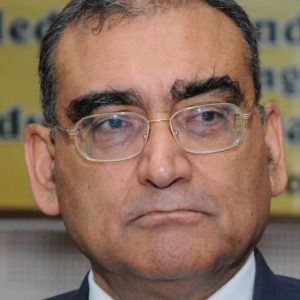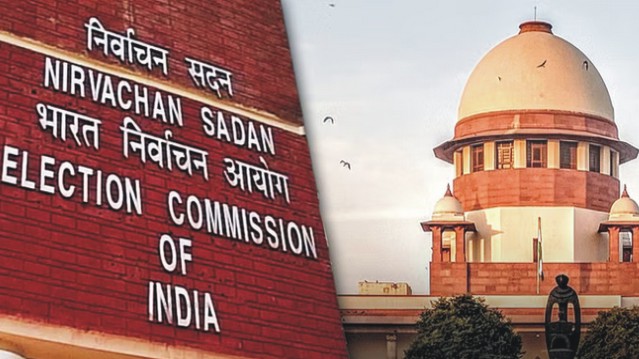

Article 324(2) of the Indian Constitution states :
“The Election Commission shall consist of the Chief Election Commissioner and such number of other Election Commissioners, if any, as the President may from time to time fix, and the appointment of the Chief Election Commissioner and other Election Commissioners shall, subject to the provisions of any law made in that behalf by Parliament, be made by the President.”
A bare reading of this provision makes it evident that the Chief Election Commissioner and other Election Commissioners can only be appointed by the President of India, unless Parliament provides otherwise. Since Parliament has not enacted otherwise, the President alone is to make such appointments.

It is being argued, however, in a case before the Supreme Court, that since Parliament has not made a law under Article 324(2), the Supreme Court should appoint a neutral body for appointing the CEC and other Election Commissioners.
In this connection the decision of the Supreme Court in Vishakha vs State of Rajasthan, 1997, as well as the decisions of the Supreme Court in the Judges cases have been relied upon.
In Vishakha’s case the Supreme Court found that there was no law for protection of women from sexual harassment in workplaces. Hence the Court itself created law in the form of guidelines, and observed that these would have the effect of law until Parliament enacted some law on the subject.
In the Judges cases (Supreme Court Advocate on Record Association vs Union of India, 1993 and In re Special Reference, 1998) the Supreme Court created a Collegium system for appointment of judges of the Supreme Court and High Courts.
I respectfully submit that these cases being relied upon by the petitioner were wrongly decided, and need to be reconsidered.

I have recently written an article about the role of the judiciary, and I have stated therein that the judiciary must excercise self restraint, and not encroach into the domain of the legislature or executive, as there is a separation of powers between the 3 organs of the state under our Constitution. In particular, I have said that judges should not make law, as that is the job of the legislature.
In Vishakha’s case, the Supreme Court made law, and said that this would continue till another law is made by Parliament. But is this legitimate excercise of judicial powers ?
Can the Supreme Court convert itself into an interim Parliament, and make laws, saying that this would be the law until Parliament makes some other law ? I submit it cannot. There is no provision in the Constitution enabling the Court to become an interim Parliament.
As regards the Judges cases, the Supreme Court practically amended Article 124(2) of the Constitution which states :
“Every Judge of the Supreme Court shall be appointed by the President by warrant under his hand and seal after consultation with such of the Judges of the Supreme Court and of the High Courts in the States as the President may deem necessary for the purpose and shall hold office until he attains the age of sixty five years: Provided that in the case of appointment of a Judge other than the chief Justice, the chief Justice of India shall always be consulted.”
 There is no mention here of any Collegium system. Where have the judges got it from? Amendment of the Constitution can only be legitimately done by Parliament in accordance with Article 368. It cannot be done by the Court. But in these decisions the Supreme Court has amended Article 124(2). Was this legitimate excercise of judicial powers?
There is no mention here of any Collegium system. Where have the judges got it from? Amendment of the Constitution can only be legitimately done by Parliament in accordance with Article 368. It cannot be done by the Court. But in these decisions the Supreme Court has amended Article 124(2). Was this legitimate excercise of judicial powers?
I respectfully submit that these decisions need to be revisited. ![]()
___________
Also Read:
Centre’s Opaque Auction Rules For Pulses Rip Off Govt Coffers, Help Millers Strike Rich
Need to amend laws like UAPA to provide for punishment for those who slap false cases
Global Arms Trade: Who are the real winners?
Why not 40 pc tickets for women in Punjab and elsewhere?
Punjab – How a deadly cocktail of Agri-Water-Energy nexus going to destroy it?

Disclaimer : PunjabTodayTV.com and other platforms of the Punjab Today group strive to include views and opinions from across the entire spectrum, but by no means do we agree with everything we publish. Our efforts and editorial choices consistently underscore our authors’ right to the freedom of speech. However, it should be clear to all readers that individual authors are responsible for the information, ideas or opinions in their articles, and very often, these do not reflect the views of PunjabTodayTV.com or other platforms of the group. Punjab Today does not assume any responsibility or liability for the views of authors whose work appears here.
Punjab Today believes in serious, engaging, narrative journalism at a time when mainstream media houses seem to have given up on long-form writing and news television has blurred or altogether erased the lines between news and slapstick entertainment. We at Punjab Today believe that readers such as yourself appreciate cerebral journalism, and would like you to hold us against the best international industry standards. Brickbats are welcome even more than bouquets, though an occasional pat on the back is always encouraging. Good journalism can be a lifeline in these uncertain times worldwide. You can support us in myriad ways. To begin with, by spreading word about us and forwarding this reportage. Stay engaged.
— Team PT


Copyright © Punjab Today TV : All right Reserve 2016 - 2025 |